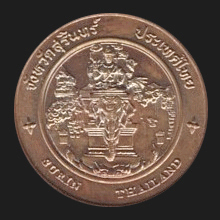Sanskrit-Thai. ‘God
Indra’. Name
of a province (map)
in
Isaan, 457 kilometers northeast of
Bangkok
and bordering
Cambodia.
Its capital city of the same name has a population of approximately
40,000 and is known for its annual elephant festival at the end of
November. Surin is a compound name, in which the first syllable
originates from the Sanskrit word Sura (सुर),
meaning ‘god’, whereas the word
In is Thai for
Indra. The city, which in 1763 was moved to its present-day location
when still a village, was formerly known as
Meuang
Prathai Saman (เมืองประทายสมันต์). After local residents, under the
leadership of a man named Chiangpum (เชียงปุม) or simply Pum (ปุม),
presented
a
White Elephant
caught in the wild to the royal court in
Thonburi,
Chiangpum was bestowed with the royal title Luang Surin Phakdi
(หลวงสุรินทร์ภักดี) and appointed village headman, and later
governor under the title
Phraya
Surin Phakdi Sri Narong Changwang. In 1786, the city's name was
changed to Meuang Surin in honour of this local ruler, who is
generally regarded as the founder of Surin (fig.).
The area was originally part of the ancient
Khmer empire and a substantial ethnic
Khmer minority remain part of present-day Surin. Besides the
official Thai language, over 47% of the population still speak a
northern Khmer dialect today. Local places of interest in the
province include several ancient Khmer temples, mainly in the area
around the Cambodian border, along with a group of three sites
generally known by the name of
Prasat Ta Meuan
(fig.)
and
Prasat Hin Ban Phluang.
In the city's centre, one of the places of interest is the Phraya
Surin Phakdi Sri Narong Changwang Monument (map
-
fig.).
The province has thirteen
amphur
and four
king amphur.
See also
Surin data file.
回







